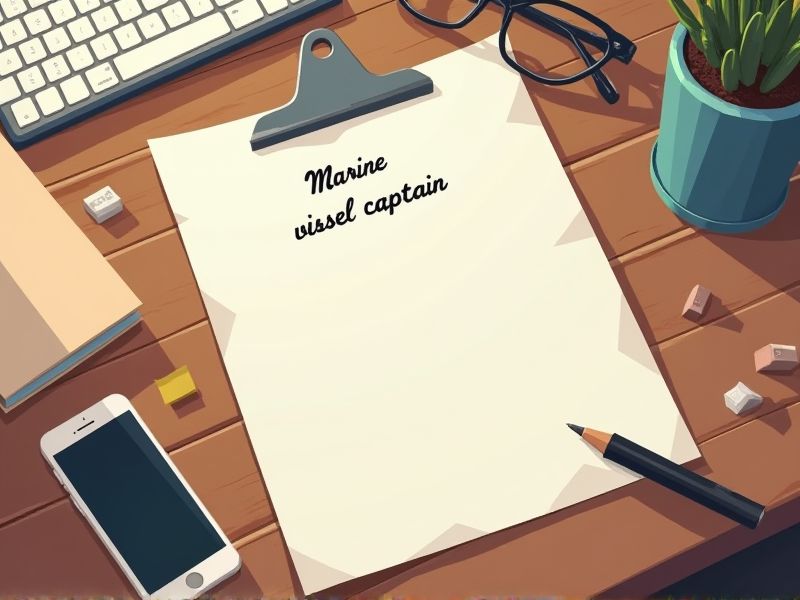
Marine vessel captains operate within highly regulated environments, where adherence to safety and legal standards is paramount. Certifications ensure captains have the necessary skills to navigate complex maritime challenges and manage emergencies effectively. These credentials validate a captain's competence in commanding crews and safely transporting cargo or passengers. Listed below are key certifications a Marine vessel captain may need.
Master Mariner Certificate of Competency
Obtaining a Master Mariner Certificate of Competency ensures a captain possesses the highest level of navigational and management skills for commanding large vessels. It provides standardized credentials that demonstrate the captain's ability to comply with international maritime laws and safety regulations. The certification qualifies captains to handle complex maritime operations and potential emergencies at sea. Having such certification enhances employment opportunities and trust from employers in the maritime industry.
STCW Basic Safety Training Certificate
The STCW Basic Safety Training Certificate ensures marine vessel captains understand fundamental safety protocols crucial for onboard emergency situations. This certification establishes compliance with international regulations, promoting safe and sustainable maritime operations. Without this certificate, captains risk legal ramifications and operational inefficiencies due to non-compliance with the International Maritime Organization standards. It also fosters trust among crew members and stakeholders, ensuring captains are equipped to handle potential hazards effectively.
STCW Advanced Firefighting Certificate
The STCW Advanced Firefighting Certificate equips a marine vessel captain with essential skills to manage and lead firefighting operations on board, enhancing maritime safety. Compliance with international maritime regulations necessitates this certification, ensuring that the captain is prepared to respond effectively to fire-related emergencies at sea. Understanding advanced firefighting techniques and strategies mitigates the risk of vessel damage and potential hazards to crew members. This certification bolsters a captain's ability to make quick, informed decisions under pressure, crucial for preserving lives and property during incidents.
STCW Proficiency in Survival Craft and Rescue Boats Certificate
The STCW Proficiency in Survival Craft and Rescue Boats Certificate equips marine vessel captains with essential skills to ensure crew and passenger safety during emergencies. This certification provides comprehensive training in operating life-saving appliances and managing evacuation procedures. Without this qualification, captains may lack the critical knowledge required to efficiently deploy and handle survival craft and rescue boats. Compliance with international maritime safety standards mandates this certification to enhance overall maritime safety and operational preparedness.
STCW Medical First Aid Certificate
Possessing an STCW Medical First Aid Certificate equips a marine vessel captain to handle medical emergencies at sea, where access to professional medical services is delayed. This qualification ensures the captain can make informed decisions about treating injuries or illnesses, thus safeguarding crew health and safety. Increased competency in medical first aid bolsters a vessel's compliance with international maritime regulations, reducing potential liabilities. Training enhances the captain's ability to stabilize critical situations, potentially preventing more severe outcomes before reaching port or professional medical assistance.
Bridge Resource Management (BRM) Certification
Bridge Resource Management (BRM) Certification is needed to enhance decision-making skills among marine vessel captains, effectively reducing accidents caused by human error. The certification focuses on improving communication, leadership, and teamwork on the bridge, ensuring a coordinated approach in crisis situations. It equips captains with strategies to optimize resource use, vital for maintaining safety in complex maritime environments. Without BRM certification, captains may lack the structured training necessary to efficiently manage their crew's skills and potential under high-pressure conditions.
Maritime Security Awareness Certificate
A Maritime Security Awareness Certificate equips a marine vessel captain with the knowledge to identify security threats and respond effectively, enhancing vessel safety. With increased piracy and maritime crime, comprehensive training is crucial for avoiding potential threats. International regulations, such as the International Ship and Port Facility Security Code (ISPS), mandate specific security training requirements, ensuring compliance with global standards. An informed captain fosters a culture of security vigilance among the crew, minimizing risks during voyages.
Radar and ARPA Operations Certification
A Radar and ARPA Operations Certification equips a marine vessel captain with the skills to effectively use radar technology, enhancing navigational accuracy. This certification ensures the captain can interpret radar data to make timely decisions, reducing the risk of collisions. Mastery of these systems is crucial for safe navigation, especially in low visibility conditions. Certification demonstrates compliance with international maritime safety regulations, which is mandatory for professional operation.
Ship Handling and Maneuvering Certification
A Ship Handling and Maneuvering Certification ensures a captain possesses the necessary skills to safely navigate complex waterways. Lack of this certification could lead to increased risk of maritime accidents, jeopardizing vessel safety and crew welfare. Proper certification demands demonstrated proficiency in emergency response, essential for crisis management at sea. Regulatory compliance with international maritime standards necessitates captains to hold relevant certifications to uphold industry safety benchmarks.
Maritime Law and Environmental Compliance Certificate
A Maritime Law and Environmental Compliance Certificate equips a marine vessel captain with essential knowledge of international regulations, reducing the risk of legal infractions. Compliance ensures vessels are operated within environmental standards, helping to protect marine ecosystems from harm. Possession of the certificate can enhance a captain's career prospects by demonstrating commitment to responsible and sustainable maritime practices. Maintaining adherence to these regulations can help prevent costly fines and reputational damage for both the captain and their employer.
Summary
When you ensure a Marine vessel captain is certified, it instills confidence in their navigation and leadership skills. Certification equips the captain with updated safety protocols and technological expertise, leading to smoother operations at sea. As a result, certified captains contribute to enhancing the overall safety and efficiency of maritime operations. Ultimately, this can lead to increased trust and reputation for the vessel's operating company.
